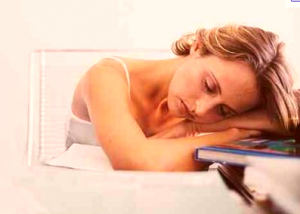Overactive thyroid gland, also called hyperthyroidism happens due over production of thyroid hormones. Thyroid gland, situated at the bottom area of the neck is associated with the secretion of thyroxine (T-4) and triiodothyronine (T-3), two very important hormones that regulate metabolism body temperature and heart-rate. So, excess secretion of thyroid hormones can augment the metabolic rate, which can lead to health problems like irregular heart-beats, anxiety etc. The secretion of hormones by the thyroid gland is controlled by another hormone, called thyroid stimulating hormone (TSH) which is secreted by the pituitary gland. TSH is regulated by the hypothalamus, the almond sized organ in the brain that is connected with hunger, thirst, sleep, fatigue, body temperature and circadian cycles.
Overactive Thyroid Symptoms in Women
Women exhibit similar symptoms of an overactive thyroid as men. But women also display an additional set of symptoms associated with menstruation. The overactive thyroid or hyperthyroidism symptoms in women are as follows:
Menstrual irregularities (light periods )
Increased appetite
Weight loss despite increased appetite
Hot flashes
Excessive sweating
Rapid heartbeat ( tachycardia)
Irregular heartbeat or arrhythmia
Nervousness
Anxiety and irritability
Pain in the joints
Tremors in hands and fingers
Frequent bowel movements
Inability to get adequate sleep
Fatigue and muscle weakness
Osteoporosis
Inability to concentrate
Women in their menopause can also experience more muscle weakness, problems with breathing and chest pain. One of the diseases that is caused by an overactive hormone is Grave’s disease that is characterized by protruding eye balls, swelling of the eye redness in the eye, increased sensitivity to the light and double vision.
Causes of hyperthyroidism in women
Excessive intake of iodine, thyroid hormone medications, a condition called thyroiditis are causes of an overactive thyroid in women. High thyroid secretions especially an increase in the release of the hormone thyroxine can cause an auto-immune condition called Grave’s disease. In this disease, the immune system can produce antibodies that can destroy cells in the thyroid gland, causing hyperthyroidism. Grave’s disease is also caused by high stress, exposure to certain viruses, smoking, certain drugs etc. Hyperthyroidism in women can also be caused due to adenomas that produce thyroxine on its own, i.e. without reacting to the level of TSH.
Overactive Thyroid symptoms in women diagnosis
Overactive thyroid in women is detected by going through the medical history of the patient and through physical examinations like blood tests to evaluate the level of TSH and thyroxine, thyroid scan and RIUT( Radioactive iodine uptake test).
Treatment for overactive thyroid in women
Some of the popular treatment options for overactive thyroid in women include anti-thyroid medications, radioactive iodine, thyroidectomy and thyroid surgery. The symptoms of overactive thyroid in women like rapid heartbeats, palpitations can be treated with beta blockers.
In case, the woman is suffering from Graves disease and has a condition affecting the eyes known as Grave’s ophthalmopathy, then lubricating gels, artificial tears may be prescribed. In serious cases, surgical procedures and corticosteroids and even eye muscle surgery and orbital decompression surgery may be advisable for Grave’s ophthalmopathy
Surgery for overactive thyroid is used only in some cases, when the patient is not responding to anti-thyroid medications. In surgery, a substantial part of thyroid gland is taken off, and the patient has to take synthetic thyroid hormone for the rest of her life.
Levothyroxine is a commonly prescribed medication for easing overactive thyroid symptoms in women.. Doctors will recommend the lowest dose that can work to alleviate the symptoms and reduce the TSH level to a normal range. In case, the woman has heart disease or is above 60, the dosage may be quite small. There is a condition called transient viral thyroiditis in which there is a need for lifelong therapy.
The medications have to be continued even after hyperthyroidism symptoms in women go away. The doctor will check the hormone levels every three months or so. The thyroid hormone levels need to be monitored at least once a year after successful treatment.
One mistake that people make is that they discontinue taking medication once they are treated of overactive thyroid hormone. Your doctor is the best judge of the situation and will tell you how to go about taking the medicine. Thyroid medications work best when you have them on an empty stomach. Your doctor will advise you against taking thyroid with iron, calcium, aluminum, fiber supplements etc.
Overactive thyroid in women complications
If overactive thyroid symptoms in women are not treated, then the woman may be prone to problems like eye problems, weaker bones, heart diseases and thyrotoxic crisis. Thyrotoxic crisis, caused due to excess production of overactive thyroid can be quite dangerous and hence needs to be treated promptly. It is not easy to detect overactive thyroid symptoms in women, especially in the early stages. So take a keen interest in symptoms that may appear likely to the problem and get them checked with your doctor
